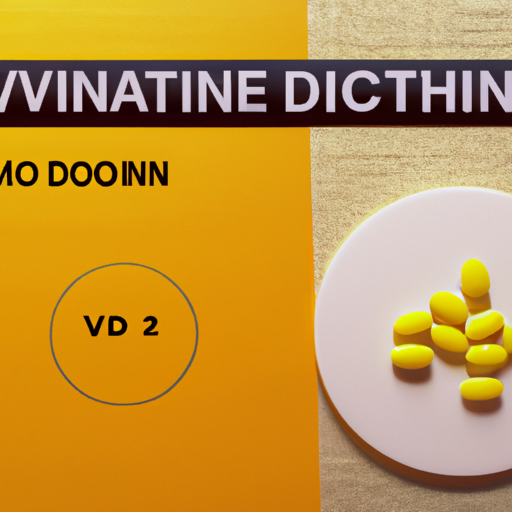
Does Vitamin D Cause Constipation
-
Contents
- 1 The Role of Vitamin D in Digestive Health: Does Vitamin D Cause Constipation?
- 2 Exploring the Link Between Vitamin D Deficiency and Constipation
- 3 How to Avoid Constipation When Taking Vitamin D Supplements
- 4 The Benefits of Vitamin D for Constipation Relief
- 5 Understanding the Relationship Between Vitamin D and Bowel Movements: Does Vitamin D Cause Constipation?
- 6 Q&A
Table of Contents
- The Role of Vitamin D in Digestive Health: Does Vitamin D Cause Constipation?
- Exploring the Link Between Vitamin D Deficiency and Constipation
- How to Avoid Constipation When Taking Vitamin D Supplements
- The Benefits of Vitamin D for Constipation Relief
- Understanding the Relationship Between Vitamin D and Bowel Movements: Does Vitamin D Cause Constipation?
- Q&A
Vitamin D is an essential nutrient that plays a key role in many bodily functions, including bone health, immune system function, and muscle strength. It is also believed to have a role in digestive health, and some people believe that it can cause constipation. In this article, we will discuss the evidence for and against the idea that vitamin D can cause constipation. We will also look at the potential benefits of vitamin D supplementation and how to ensure that you are getting enough of this important nutrient.
The Role of Vitamin D in Digestive Health: Does Vitamin D Cause Constipation?
Vitamin D is an essential nutrient that plays a vital role in many aspects of human health, including digestive health. While vitamin D is known to be beneficial for digestive health, there is some debate as to whether or not it can cause constipation. In this article, we will explore the role of vitamin D in digestive health and discuss whether or not it can cause constipation.
Vitamin D is a fat-soluble vitamin that is naturally present in some foods, such as fatty fish, egg yolks, and fortified milk. It is also produced in the body when the skin is exposed to sunlight. Vitamin D is important for many bodily functions, including the absorption of calcium and phosphorus, which are essential for strong bones and teeth. It also plays a role in the regulation of the immune system and the production of hormones.
In terms of digestive health, vitamin D is thought to be beneficial in several ways. It has been shown to reduce inflammation in the digestive tract, which can help to reduce symptoms of irritable bowel syndrome (IBS). Vitamin D may also help to reduce the risk of developing certain digestive disorders, such as Crohn’s disease and ulcerative colitis.
Despite the potential benefits of vitamin D for digestive health, there is some debate as to whether or not it can cause constipation. While there is no definitive answer to this question, some studies have suggested that vitamin D deficiency may be linked to constipation. However, more research is needed to confirm this link.
In conclusion, vitamin D plays an important role in digestive health and may help to reduce the risk of certain digestive disorders. While there is some debate as to whether or not it can cause constipation, more research is needed to confirm this link.
Exploring the Link Between Vitamin D Deficiency and Constipation
Vitamin D deficiency is a common health issue that can have a wide range of effects on the body. One of the lesser-known effects of vitamin D deficiency is constipation. In this article, we will explore the link between vitamin D deficiency and constipation, and discuss the potential treatments for this condition.
Vitamin D is a fat-soluble vitamin that is essential for the absorption of calcium and phosphorus, which are important for bone health. Vitamin D is also important for the regulation of the immune system, and it has been linked to a number of other health benefits. Vitamin D deficiency is a common problem, particularly in the elderly, and it can lead to a number of health issues.
One of the potential effects of vitamin D deficiency is constipation. Studies have shown that people with low levels of vitamin D are more likely to suffer from constipation than those with normal levels. This is thought to be due to the fact that vitamin D plays an important role in the regulation of the digestive system. Low levels of vitamin D can lead to an imbalance in the hormones that regulate digestion, which can lead to constipation.
The good news is that constipation caused by vitamin D deficiency can be treated. The first step is to get your vitamin D levels checked. If your levels are low, your doctor may recommend taking a vitamin D supplement. In addition, increasing your intake of foods that are rich in vitamin D, such as fatty fish, eggs, and fortified milk, can help to increase your levels.
In conclusion, vitamin D deficiency can lead to constipation. If you are experiencing constipation, it is important to get your vitamin D levels checked. If your levels are low, taking a vitamin D supplement and increasing your intake of vitamin D-rich foods can help to alleviate the symptoms of constipation.
How to Avoid Constipation When Taking Vitamin D Supplements
Constipation is a common side effect of taking vitamin D supplements. To avoid this uncomfortable condition, it is important to take the right precautions.
First, it is important to take the correct dosage of vitamin D. Taking too much can lead to constipation. It is best to consult with a doctor or nutritionist to determine the correct dosage for your individual needs.
Second, it is important to drink plenty of fluids when taking vitamin D supplements. Staying hydrated helps to keep the digestive system functioning properly and can help to prevent constipation.
Third, it is important to eat a balanced diet that includes plenty of fiber. Fiber helps to keep the digestive system functioning properly and can help to prevent constipation. Eating foods such as fruits, vegetables, and whole grains can help to ensure that you are getting enough fiber in your diet.
Fourth, it is important to get regular exercise. Exercise helps to keep the digestive system functioning properly and can help to prevent constipation.
Finally, it is important to take the time to relax. Stress can have a negative effect on the digestive system and can lead to constipation. Taking the time to relax and unwind can help to keep the digestive system functioning properly and can help to prevent constipation.
By following these simple steps, you can help to avoid constipation when taking vitamin D supplements.
The Benefits of Vitamin D for Constipation Relief
Vitamin D is an essential nutrient that plays a vital role in many bodily functions, including digestion. Recent studies have shown that Vitamin D can be beneficial in relieving constipation. Constipation is a common digestive disorder that can cause abdominal pain, bloating, and difficulty passing stools.
Vitamin D helps to regulate the absorption of calcium and phosphorus in the intestines, which can help to reduce constipation. Vitamin D also helps to increase the production of mucus in the intestines, which helps to lubricate the stool and make it easier to pass. Additionally, Vitamin D helps to stimulate the muscles in the intestines, which can help to move the stool along the digestive tract.
Vitamin D can be found in a variety of foods, including fatty fish, egg yolks, and fortified milk. It can also be taken as a supplement. Taking a Vitamin D supplement can help to increase the amount of Vitamin D in the body, which can help to relieve constipation.
In addition to taking a Vitamin D supplement, there are other lifestyle changes that can help to relieve constipation. Eating a diet high in fiber, drinking plenty of water, and exercising regularly can all help to reduce constipation. Additionally, avoiding foods that are high in fat and sugar can help to reduce constipation.
Overall, Vitamin D can be beneficial in relieving constipation. Taking a Vitamin D supplement and making lifestyle changes can help to reduce constipation and improve overall digestive health.
Understanding the Relationship Between Vitamin D and Bowel Movements: Does Vitamin D Cause Constipation?
Vitamin D is an essential nutrient that plays a vital role in many bodily functions, including the absorption of calcium and phosphorus, which are necessary for healthy bones and teeth. It is also known to have a positive effect on the immune system, as well as on the cardiovascular and nervous systems. However, there is some evidence to suggest that vitamin D may also be linked to bowel movements.
The relationship between vitamin D and bowel movements is complex and not fully understood. Some studies have suggested that vitamin D deficiency may be associated with constipation, while other studies have found no such link. It is important to note that vitamin D deficiency is not the only factor that can cause constipation. Other factors, such as diet, lifestyle, and certain medications, can also contribute to constipation.
It is also important to note that vitamin D is not the only nutrient that can affect bowel movements. Other vitamins and minerals, such as magnesium, calcium, and iron, can also play a role in regulating bowel movements. Additionally, certain medications, such as laxatives, can also affect bowel movements.
At this time, there is not enough evidence to definitively say that vitamin D causes constipation. However, it is important to ensure that you are getting enough vitamin D in your diet, as it is essential for many bodily functions. If you are concerned about your vitamin D levels, it is best to speak to your doctor or healthcare provider. They can help you determine if you need to take a supplement or make dietary changes to ensure that you are getting enough vitamin D.
Q&A
1. Does Vitamin D cause constipation?
No, Vitamin D does not cause constipation. However, it is possible that taking too much Vitamin D can lead to constipation. It is important to talk to your doctor before taking any Vitamin D supplements to make sure you are taking the right amount.
2. What are the symptoms of Vitamin D deficiency?
The most common symptoms of Vitamin D deficiency include fatigue, muscle weakness, bone pain, and depression. Other symptoms may include hair loss, poor appetite, and difficulty sleeping.
3. What are the benefits of Vitamin D?
Vitamin D is important for many bodily functions, including maintaining healthy bones and teeth, regulating the immune system, and helping the body absorb calcium. Vitamin D also helps to reduce inflammation and may help to reduce the risk of certain types of cancer.
4. What foods are high in Vitamin D?
Foods that are high in Vitamin D include fatty fish such as salmon, tuna, and mackerel, as well as fortified milk, yogurt, and orange juice. Egg yolks, beef liver, and mushrooms are also good sources of Vitamin D.
5. How much Vitamin D should I take?
The recommended daily allowance of Vitamin D is 600 IU (international units) for adults up to age 70, and 800 IU for adults over 70. It is important to talk to your doctor before taking any Vitamin D supplements to make sure you are taking the right amount.In conclusion, there is no scientific evidence to suggest that Vitamin D causes constipation. However, it is important to note that Vitamin D can interact with certain medications and supplements, so it is important to speak to a doctor before taking any new supplements. Additionally, if constipation persists, it is important to speak to a doctor to rule out any underlying medical conditions.

